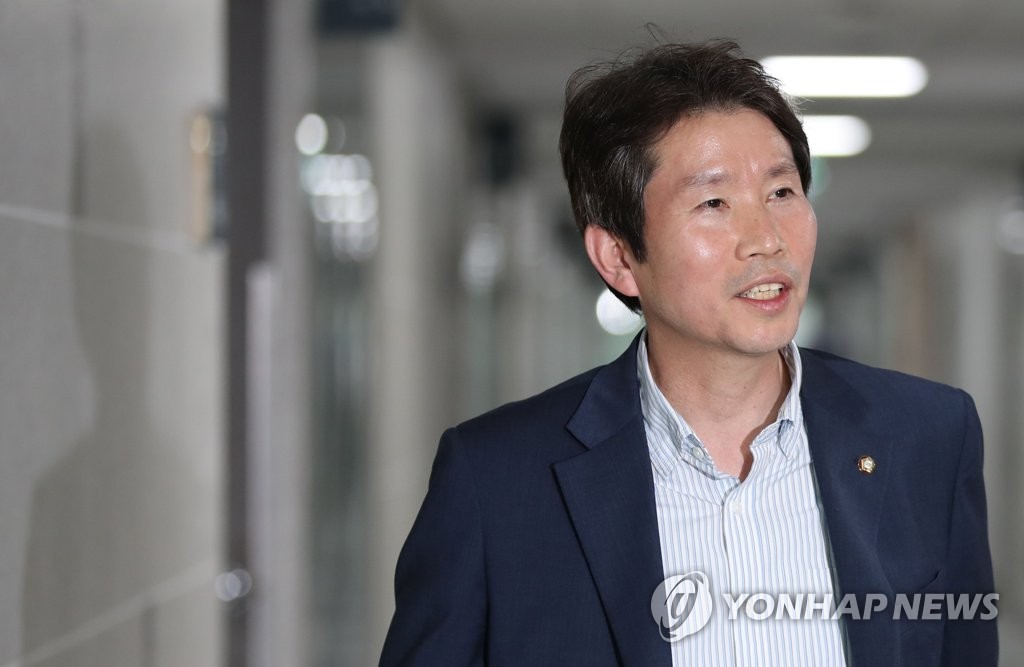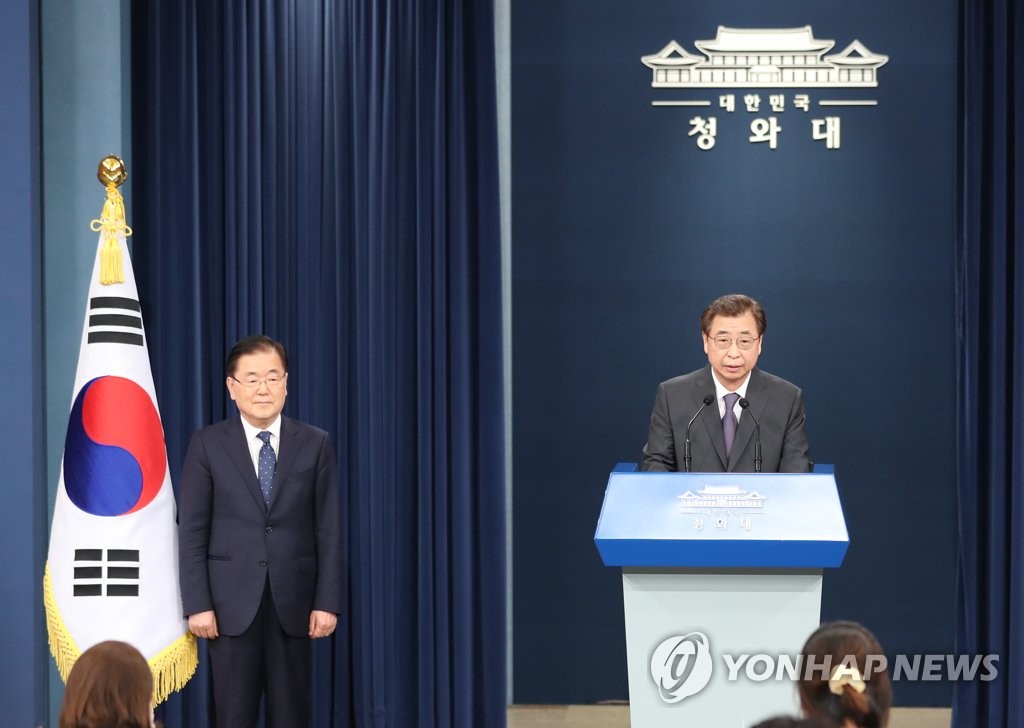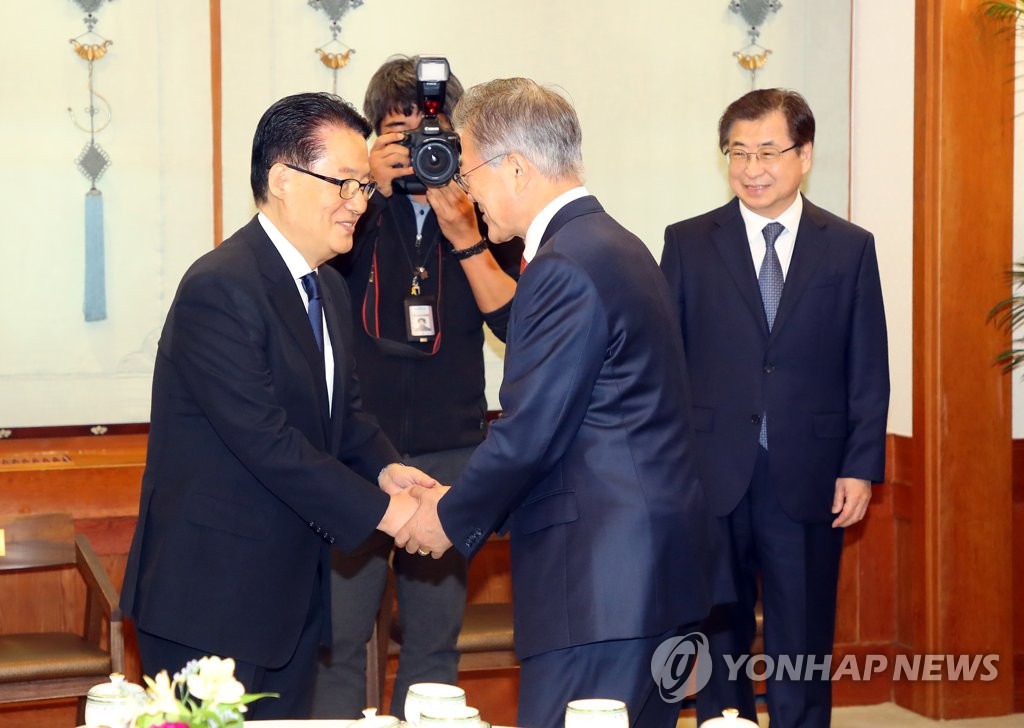- California Assembly OKs highest minimum wage in nation
- S. Korea unveils first graphic cigarette warnings
- US joins with South Korea, Japan in bid to deter North Korea
- LPGA golfer Chun In-gee finally back in action
- S. Korea won’t be top seed in final World Cup qualification round
- US men’s soccer misses 2nd straight Olympics
- US back on track in qualifying with 4-0 win over Guatemala
- High-intensity workout injuries spawn cottage industry
- CDC expands range of Zika mosquitoes into parts of Northeast
- Who knew? ‘The Walking Dead’ is helping families connect
Four-term ruling party lawmaker named unification minister, NIS chief as national security director
President Moon Jae-in nominated Lee In-young, a four-term ruling party lawmaker, as South Korea’s new unification minister Friday in a shake-up of his security team aimed at providing fresh momentum to troubled efforts to improve inter-Korean ties and revitalize the peace process.
Moon also tapped Suh Hoon, head of the National Intelligence Service (NIS), as new director of national security.
Lee, known for brisk involvement in peace-related activities as a lawmaker with the Democratic Party, is to succeed Kim Yeon-chul, who resigned days after North Korea’s June 16 demolition of a joint liaison office in its border city of Kaesong. Pyongyang also cut cross-border communications, ostensibly in anger over anti-Pyongyang leaflets sent from the South.
Kim said he was taking responsibility for the great strain in inter-Korean relations.
Lee, who served as the party’s floor leader until recently, faces the National Assembly’s confirmation hearing, but its approval is not a requirement for the president to appoint him.



Rep. Lee In-young of the Democratic Party, named as new unification minister, walks out of his room at the National Assembly in western Seoul on July 3, 2020. (Yonhap)
Lee told reporters that he has accepted Moon’s offer of the position with “a sense of urgency that (we) should again open the door of peace before it’s closed.” He emphasized the need to resume dialogue between the two Koreas and implement their existing accords.
Suh is replacing Chung Eui-yong as director of national security at Cheong Wa Dae. Chung’s departure was widely expected, as he has served at the post since the launch of the Moon administration three years ago. Chung, in particular, has worked as Cheong Wa Dae’s point man on the White House for consultations on North Korea and major alliance issues.
Moon’s pick of Suh as his top security adviser is seen by some observers as heralding a shift in his approach in the tumultuous peace drive. Suh has expertise on the North Korea issue and reportedly has a relatively wide network of personal ties with officials in the communist neighbor.
Suh pointed out that he is assuming the job at a “grave time both internally and externally.”
“We will respond prudently to the current situation on the Korean Peninsula but will also prepare to move boldly sometimes,” he said in a statement shortly after Cheong Wa Dae’s announcement.
“It’s very important to continuously secure the international community’s support for our external and North Korea policy,” he added.
He noted that the Moon administration’s goal is to “systemically establish” peace on the peninsula and that it would make ceaseless efforts to achieve complete denuclearization.
“I won’t neglect communication with neighboring countries,” he said. “Especially, I will communicate and cooperate more closely with the United States, which is our ally.”
Standing behind the podium of Cheong Wa Dae’s press room as well, Chung expressed confidence that the Korea peace process will succeed on the basis of trust among the leaders of the U.S. and the two Koreas.
He was guarded about his work so far under the Moon administration.
“I have stories I would like to talk about over what I have gone through as director of national security. But I don’t think it’s the time yet,” he said.
The president also picked another political heavyweight — former lawmaker Park Jie-won — to lead the NIS.
Park was chief presidential secretary to late President Kim Dae-jung, who had a historic summit in 2000 with the North’s then leader Kim Jong-il. Park was defeated in the April 15 parliamentary elections as a member of the minor opposition Party for People’s Livelihoods.
Moon, meanwhile, has decided to appoint Chung and Lim Jong-suk, former presidential chief of staff, as special advisers for diplomatic and security affairs, according to Cheong Wa Dae spokesman Kang Min-seok.











